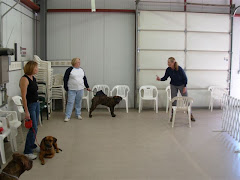Salmon Poisoning Disease is a potentially fatal condition seen in dogs that eat certain types of raw fish. Salmon (salmonid fish) and other anadromous fish (fish that swim upstream to breed) can be infected with a parasite called Nanophyetus salmincola. Overall, the parasite is relatively harmless. The danger occurs when the parasite itself is infected with a rickettsial organism called Neorickettsia helminthoeca. It’s this microorganism that causes salmon poisoning.
"Salmon poisoning occurs most commonly west of the Cascade mountain range," says Dr. Bill Foreyt, a veterinary parasitologist at Washington State University’s College of Veterinary Medicine. He adds, "Canids (dogs) are the only species susceptible to salmon poisoning. That’s why cats, raccoons and bears eat raw fish regularly with out consequence."
Generally clinical signs appear within six days of a dog eating an infected fish. Common symptoms of salmon poisoning include:
· vomiting
· lack of appetite
· fever
· diarrhea
· weakness
· swollen lymph nodes
· dehydration
· vomiting
· lack of appetite
· fever
· diarrhea
· weakness
· swollen lymph nodes
· dehydration
Salmon poisoning is usually fatal if not treated. If untreated, death usually occurs within fourteen days of eating the infected fish. Ninety percent of dogs showing symptoms die if they are not treated!
Thankfully, salmon poisoning is treatable if it’s caught in time. A key to its diagnosis is telling your veterinarian that your dog ate raw fish. If you have a dog that wanders, or raids trashcans and you are unsure of what it’s eaten, consider the possibility of salmon poisoning. Salmon poisoning can be diagnosed with a fecal sample or a needle sample of a swollen lymph node. Detecting the parasite’s eggs as they are shed in the feces confirms its presence. The rickettsial organism can be detected in a needle sample from a swollen lymph node. The combination of symptoms, and the presence of parasite eggs or the rickettsial organisms, are enough to justify treatment. If caught early, most dogs respond rapidly to treatment.
Given the severity of the condition, treatment is relatively simple. Your veterinarian will prescribe an antibiotic and a "wormer." The antibiotic kills the rickettsial organisms that cause the illness, and the wormer kills the parasite. If the dog is dehydrated, intravenous fluid are given. Once treatment has been started, most dogs show dramatic improvement within two days.
Given the severity of the condition, treatment is relatively simple. Your veterinarian will prescribe an antibiotic and a "wormer." The antibiotic kills the rickettsial organisms that cause the illness, and the wormer kills the parasite. If the dog is dehydrated, intravenous fluid are given. Once treatment has been started, most dogs show dramatic improvement within two days.
Next time you are fishing, or purchase raw salmon, and you hear the familiar begging whine of your dog, ignore it. They may not understand it, but not sharing the fish is the best thing for them. This will save them from suffering salmon poisoning, and save you from a veterinary bill.


















No comments:
Post a Comment